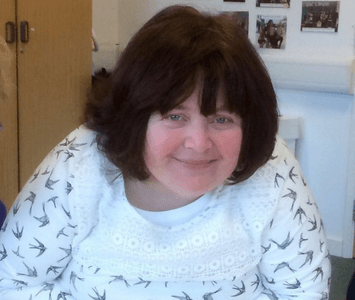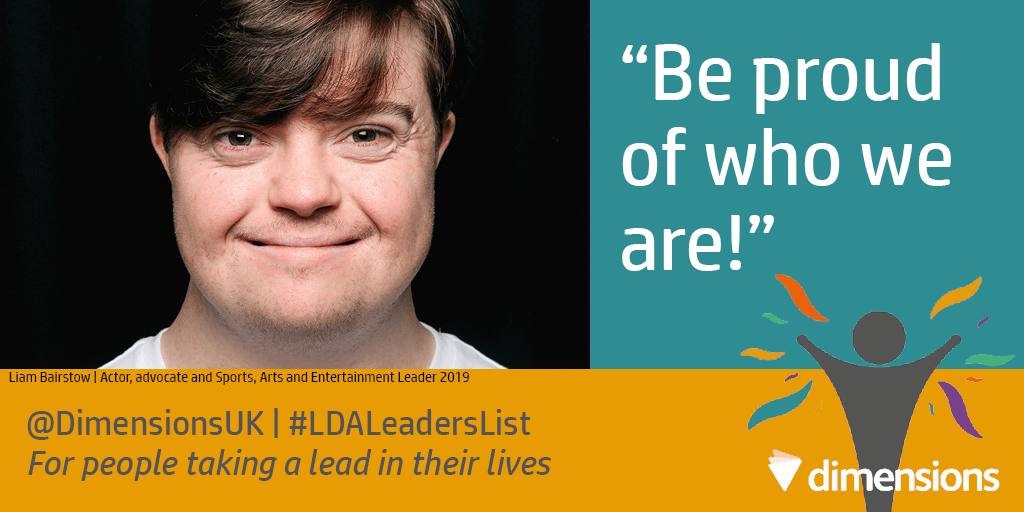Jodie: Learning Disability and Autism Network Manager in the NHS
We sat down with Jodie Williams, winner of the Leaders’ List in the Advocacy Policy and Media category to find out more about what she has achieved and her thoughts on becoming a Leader.

Hi, Jodie, could you tell us a bit more about yourself?
I’m 42 years old and live in Sunderland.
I have a learning disability and am waiting for an autism assessment. I also have diabetes and depression.
Who nominated you?
I was nominated by my manager at NHS England, Jo Whaley.
We understand you were nominated for you advocacy work, could you tell us about your journey and what you do now?
I had a difficult time when I was at school; I was very quiet and was kept in at breaktimes during senior school because I would be heavily bullied if I went outside. I felt that no one could see my potential. I wasn’t encouraged to go to classes and had to eat lunch at the staff table.
In the end, I was suffering from mental health and started attending an evening club twice a week. This was where I heard about the advocacy group, Sunderland People First. I joined the group at 29 years old but was very shy and sat in the corner. The staff were brilliant and encouraged me to join in. I started to make friends and was invited to join the advisory group, to which I said ‘absolutely!’

“I’d like to thank Sunderland People First who saw my potential. I’d like to thank the NHS who I work with for giving me and other people with a learning disability chance to have our say. My job is about helping give others a better start in life than I had. It’s so important to see what we can do, not what we can’t do.”
Feeling part of the group and among people who understood me and saw my potential made me feel wonderful.
I started at Sunderland People First as an advocate, gained a lot of advocacy and leadership skills which grew my confidence. This led me to become one of the first people in the Northeast to do Care Education Treatment Reviews in Acute Hospitals/Health Hospitals (CETRs). I also did CETRs specifically for people in mental health hospitals.
From there, I became a Director at Inclusion North, a Director at Sunderland People First, and a Director for Sunderland Health Watch. Through these roles I trained managers in disability awareness, helped manage the money at Inclusion North, and worked with schools to educate children around perceptions of people with disabilities.
I also started doing some work for Learning Disability England (LDE). They were looking for a trustee and I was encouraged to go for the position, so I went for it. I got the role!

In my third meeting as a Trustee, I found out LDE were looking for a Co-Chair for the Trustees and, because I was the only Trustee with a disability, I said, ‘Well, I think it should be co-chaired by someone with a learning disability.’ I ended up getting the role!
While doing these roles, I saw that NHS England was looking for members. I decided ‘I am going for this’ so applied and got a position. During Covid, NHS England started looking for a Network Manager with learning disabilities. I really wanted to go for this role, but it was a difficult decision because it would mean I had to leave my Director roles at Sunderland People First, Inclusion North and Sunderland Health Watch.
In the end, I decided that this opportunity was worth it, I applied and I got the role. This job means so much to me, I always used to put myself down as a child and young adult and because it was a proper paid job I wasn’t sure I could do it – I was adamant that I wouldn’t get it.
When I was first told I got the job, I couldn’t believe how far I’d come. I even became Co-Chair almost immediately after joining!
That’s how I became a Learning Disability and Autism Network Manager for the NHS Engagement Team. This is my current job.
See a video of me interviewing the Learning Disability and Autism Director at NHS England, Tom Cahill here…
Can you tell us about your work around cervical cancer screenings?
I didn’t have a cervical screening until I was 39 years old because I was scared. I had started to help with Be Cancer Aware training, which aims to make people with learning disabilities aware of the signs of cancer, so began to think I should get my screening done.
After speaking with my learning disability nurse, we went to the nurse for the screening. The nurse was brilliant and made me feel at ease. She said, ‘Why not try, we can stop anytime?’ I went the next week and completed the screening – I conquered my fear!
Once I found out I had the all-clear, I started thinking about other people with disabilities because it has to be scary for them too.
Last year, I had to go for my screening again, but this time didn’t have my learning disability nurse. It was either do it on my own or not at all – so I thought to myself ‘I’m going to do this.’ To the amazement of the nurse, I went on my own and although it was very scary, I was okay and came out of there really pleased with myself and how it had gone.
I wanted to do something to share my experience and make people with disabilities and autism make sure they go for their screenings too.
So, I spoke with my manager at the NHS in the run-up to Cervical Screening Week and said I wanted to create an awareness video. We made the video which went on YouTube and has already had 1,800 views! This will help people feel more comfortable going for their screenings.
You seem to never back down from a challenge, what made you this way?
I just think that when I was at Sunderland People First, the staff and people saw me for who I was and what I can do. I think if I hadn’t gone there, I wouldn’t have had the confidence to become who I am today.
Do you have any other hobbies?
My hobbies are dogs and other animals. I have my assistance dog, Mindy, who I got when I started at the NHS. She comes everywhere with me and has given me a lot of confidence.
Because I have mental health issues, Mindy and other animals really help me – animals are very caring.

What you have achieved is amazing, do you have any advice for other people with disabilities?
What I say now is: see what we can do, not what we can’t do. We can have a life too.
If the other children at school could see me now, they would be shocked. Even my past teachers will sometimes say to my mum, ‘Which day centre is Jodie at?’ and my mum will tell them my story.
How did you feel when you found out you had been nominated for Leaders’ List?
I was a bit emotional because I was so pleased to see how far I had come since I left school. I was extremely happy and also a bit sad because I lost my Nanna and Dad when I was young – I wish they were here to see me now.
How did you feel when you found out you were a Leaders’ List winner?
I was really shocked and wasn’t expecting it at all. I’ve always put myself down. I have a great staff team I co-work with who understand me. I get the right support now and they have been a great team to work with. I couldn’t have gotten to where I am today without the support from Sunderland People’s First.
Why do you think initiatives like the Leaders’ List are important?
People with disabilities sometimes hear negative things. It is good to show people what we can do and go against misconceptions that we can’t do anything. It is important to celebrate our achievements – it’s not what we can’t do, it’s what we can.
Do you think there are misconceptions about what autistic people and people with learning disabilities can achieve?
Yes, I do. They don’t see the potential in these people, they just think we can’t do things or don’t give these people the best support they need because they assume they aren’t going to achieve anything.
Are you excited for the Leaders’ List event on 2nd December?
Yes, I am very excited and will absolutely be attending!











